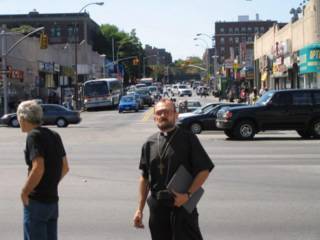Why Catholics May Morally Cooperate in the EXECUTION OF SCOTT PETERSON

That jury will soon determine the fate of Scott Peterson, 32, the cold, calculating, lying cad and sociopath who committed the ultimate human betrayal by killing his wife Laci & unborn son Conner in cold blood. The Redwood City, California court awaits a probable death penalty recommendation from the jury -- perhaps today. I delayed posting this blog until the jury decision became imminent. (The arrogant monster will be sentenced by Judge Alfred Delucchi this Feb. 25th.)
Well, just like our ultramontane Conciliar Catholic counterparts, that's what orthodox Catholic clergy are also ordained for: -- to teach, reflect and disseminate the doctrines and dogmas of The Traditional Catholic Church. Who better to ask? (As long as you ascertain his faculties, knowledge and credentials first, then, if doubts linger and/or your discernment warrants, seek other clerical opinions as well.) Some of them also asked me how I would advise (rather than guide, suggest, sway, influence or direct) them should they be called to jury duty on a capital murder case here in NY.
Recent "updates" to the social justice guidelines of the RCC seem to have confused many Catholics about this issue. Not that it conflicts with Church teaching, but arbitrary opinions of various revisionist bishops and pontiffs muddle and becloud their understanding even more. The body of these NEW Roman Catholic social doctrines is based heavily on Papal encyclicals and other major documents of the past 15 years. In June, 1998, the American bishops issued a statement titled "Sharing Catholic Social Teaching: Challenges and Directions." They identified seven principles that characterize this branch of RC doctrine (not dogma). The first one addresses the death penalty in a manner different from the past. I can only assure the Faithful that truth will always remain the same - yesterday, today and tomorrow.
The ambiguities center on the arguments the Holy Father proposed in No. 56 of his 1995 encyclical "Evangelium Vitae" (The Gospel of Life), which were later inserted into the definitive edition of the new 1994 Catechism, in Nos. 2266 and 2267. And the National Conference of US Catholic Bishops in 1980 published a predominantly negative statement on capital punishment, approved by a majority vote of those present though not by the required two-thirds majority of the entire conference.
In fact, the Catholic magisterium does not, and never has, advocated unqualified abolition of the death penalty. The US Conference of Bishops, in their majority statement on capital punishment, conceded that "Catholic teaching has accepted the principle that the State has the right to take the life of a person guilty of an extremely serious crime." Pope John Paul the Great has admitted that there is nothing immoral about the death penalty, he only asks that it be used sparingly.
Many pro-life activists, including the Roman Catholic Church, are promoting what they call a "consistent pro-life ethic," which opposes the taking of all life, lumping together opposition to abortion with opposition to the death penalty, as if there were no essential difference between killing someone who is innocent and killing someone who is guilty.
The late Joseph Cardinal Bernardin, in his famous speech on the "Consistent Ethic of Life" at Fordham in 1983, stated his concurrence with the 'classical position' that the State has the right to inflict capital punishment. Therein he made it clear that capital punishment should not be equated with abortion, euthanasia, and suicide.
U.S. Supreme Court Justice Antonin Scalia disagreed with Pope John Paul II on capital punishment. A devout RC, Justice Scalia claims that the authority with which the Pope teaches about capital punishment does NOT demand assent from a Catholic because of the long Catholic TRADITION that supports capital punishment.
(I will leave it to theologians to debate how "authoritative" any new social teaching of the Church is, but Justice Scalia's disagreement with the Pope does remind us that NOT everything that the Church teaches is taught with the same authority or binding force. I recall this elementary lesson from our Philosophy 101 course in seminary: QUES.: "What is the difference between philosophy and theology concerning arguments based on authority?" ANS.: "While in philosophy the argument from authority is weak, in theology it is the strongest argument." In philosophy, no matter what philosopher taught a particular doctrine -- the doctrine had to stand on its own and appeal to reason. There was no direct appeal in philosophy to religious faith. However, in theology, if a doctrine could be shown to be based on the teaching authority of The Church that was an excellent argument for the truth of that doctrine. Most of us have a personal philosophy regarding this issue. Theirs is based on a very loose new "doctrine" (which has loop holes galore) and ours is based on long standing TRADITION.)
Read "Responses to 101 Questions on Catholic Social Teaching" by Fr. Kenneth Himes (Paulist Press) wherein he clearly discusses the different levels on which the Catholic Church teaches. Not everything that the Church teaches is taught with the same authority. Capital punishment is one of them.
A few also asked for my opinions. At issue for Catholics is 1.) to determine the circumstances under which that penalty ought to be applied and 2.) when it is necessary to achieve the purposes of punishment (when it does not have disproportionate evil effects.) For obvious reasons that most will understand, I'm usually loath to offer my personal opinions to any of the faithful when it pertains to their particular spiritual crises. Deacons and priests must always remember that they are extensions of the teaching magisterium (Episcopacy) of The Church Catholic. As ordained professionals, we are never allowed to be free agents unto ourselves or run contrary to the One Mind of The Church. (There are dangerous "independent" clergy-at-large who do not understand this and, worse, some ambitious egos out there who do -- but do not care.)
Yet as an American citizen, I'm also entitled to the exercise of my correctly informed conscience which asks: If this remorseless degenerate is not deserving of the harshest just penalty then who is? (The prosecutor made the most compelling argument for execution by saying, "Laci was an anchor around his neck, so he put one around hers.") And that's what blogs are better utilized for. So I'll attempt to openly balance the synderesis and conscientia of both religious traditions herein with as much temperance and objectivity as possible...
Our ORCC promotes the intelligent assent and exercise of a correctly formed individual conscience. Like us ultrajectine tradition Catholics (who for centuries were censured for this tenent), "Primacy of Conscience" was later adopted by the RCC ultramontanes at Vatican Council II. My views on the matter at hand were formed in accordance with these principles. Catholics ARE allowed to disagree on how to apply Catholic principles to a particular social problem. Even the New Catechism teaches this. "Man has the right to act in conscience and in freedom so as personally to make moral decisions. He must not be forced to act contrary to his conscience. Nor must he be prevented from acting according to his conscience, especially in religious matters." (CCC Section 1782).
Most governments around the globe have recently eliminated the death penalty -- often against the protests of religious believers. While this might be viewed as moral progress, it is most likely due to the loss of the sense of sin, guilt, and retributive justice, all of which are essential to our Catholic faith. The abolition of the death penalty in formerly Christian countries is attributed more to secular humanism than to the Holy Gospel.
Among the major nations of the Western world, the United States is singular in still having the death penalty. After a five–year moratorium, from 1972 to 1977, capital punishment was reinstated in the United States courts. According to a recent Gallup poll, 74 percent of Americans support the death penalty, up dramatically from 65 percent two years ago, with 38 states now willing to carry out executions.
Some Catholics, sectarian Christians and pacifist groups (like the Waldensians, Quakers, Hutterites and Mennonites) contend that the death penalty, like abortion and euthanasia, is a violation of the right to life and an unauthorized usurpation by man of God’s dominion over life and death. They take the simplistic and absolutist position that because the right to life is sacred and inviolable, the death penalty is always wrong. Utilitarian philosophers dismiss capital punishment as "useless annihilation".
From the sociological and legal aspects, they also maintain that the Declaration of Independence describes the right to life as "unalienable". Some legal crusaders are arguing that capital punishment is unconstitutional, a violation of the Eighth Amendment's prohibition of "cruel and unusual punishment." This, despite the fact that the Constitution's Fifth Amendment makes explicit provision for "capital crimes."
Philosophers have argued that, by receiving authority through natural law, the state also derives the right to use necessary means for attaining its end, which means that the death penalty is such means. However, let us Judeo-Christian Americans consider these arguments (now considered to be a "moral revolution" or "progress of ethical consciousness") in terms of revelation as given to us through Scripture and tradition. Therein, it is agreed that crime deserves punishment in this life, not only in the next. It is also agreed that the State has authority to administer appropriate punishment to those judged guilty of crimes and that this punishment may, in serious cases, include the sentence of death.
Indeed, capital punishment is consonant with Scripture, tradition, and the natural law. The death penalty is NOT in itself a violation of the right to life as some will argue. Capital punishment does NOT denigrate the value of human life. Scripture teaches us that the value of human life is the reason for capital punishment. "Whoever sheds the blood of man, by man shall his blood be shed, for God made man in His own image" (Genesis 9:6). From that point in history lawful killing in atonement for taking the life of another is sanctioned by God.
SCRIPTURE:
The Old Testament (Mosaic Law) -- specifies no less than 36 capital offenses calling for execution by stoning, burning, decapitation, or strangulation. Included in the list are idolatry, magic, blasphemy, violation of the Sabbath, murder, adultery, bestiality, pederasty, and incest.
After the great Theophany on Mt. Sinai, Moses codified the death penalty as part of the old law of Talion, which in strict justice required “life for life, eye for eye, tooth for tooth, hand for hand, foot for foot” (Deut. 19:21).
The death penalty was considered especially fitting as a punishment for murder since in his covenant with Noah God had laid down the principle, "Whoever sheds the blood of man, by man shall his blood be shed, for God made man in His own image" (Genesis 9:6). In many cases God is portrayed as deservedly punishing culprits with death, as happened to Korah, Dathan, and Abiram (Numbers 16).
In other cases individuals such as Daniel and Mordecai are God's agents in bringing a just death upon guilty persons. According to the biblical accounts, God sometimes administers the penalty Himself and sometimes directs others to do so. (Individuals and private groups may not take it upon themselves to inflict death as a penalty.) But now the new man-centered theology takes its views almost exclusively from the standpoint of the criminal and human society rather than from God’s.
The New Testament -- the right of the State to put criminals to death seems to be taken for granted. Jesus himself refrains from using violence. He rebukes His disciples for wishing to call down fire from heaven to punish the Samaritans for their lack of hospitality (Luke 9:55). Later He admonishes Peter to put his sword in the scabbard rather than resist arrest (Matthew 26:52).
Many People think that Jesus was a passive Person who simply preached positive messages of peace. However, Jesus was often angry when confronted with injustice. He drove the money changers out of the temple (Mark 11:15-16), criticized His disciples for their doubts (Matt. 8:26; John 20:27), and condemned the Pharisees over their hypocrisy (Matt. 23; Mark 3:5). Jesus calls His followers to speak out against injustice and other moral issues boldly and not in a meek and quiet voice. He expects us to know right and wrong (Hebrews 5:14; I John 4:6) and to call attention to the problems of the world (Romans 12:9, 21; Hebrews3:12-13). He does not want us to sit quietly by when sin is winning out. We are not to be angry out of bitterness or rage (Eph. 4:31), but when we see a wrong we must speak against it. If it is not righted, we must speak out again, even if we have to do so forcefully. In order to be salt and light of the world (Matt. 5:13-14), we may, at times, need to raise our voices in righteous anger.
At no point, however, does Jesus ever deny that the State has authority to exact capital punishment. In his debates with the Pharisees, Jesus cites with approval the apparently harsh commandment, "He who speaks evil of father or mother, let him surely die" (Matthew 15:4; Mark 7:10, referring to Exodus 2l:17; cf. Leviticus 20:9).
In the Gospel of Matthew, Christ advises, "All who take the sword will perish by the sword". This is a direct warning to murderers of the just punishment that awaits them.
When Pilate calls attention to his authority to crucify Him, Jesus points out that Pilate's power comes to him from above. As He told Pontius Pilate at the time of His trial, “Thou shouldst not have any power against Me, unless it were given thee from above” (John 19:10). In so affirming and accepting, our Lord Jesus Christ sanctified His death penalty, transforming it into The Most Blessed Sacrament of life for those who believe.
Jesus commends the good thief on the cross next to Him, who has admitted that he and his fellow thief are receiving the just reward of their deeds. In the Gospel of Luke 23: 41, the thief crucified with Jesus asks Him, "Do you not fear God, since You are under the same sentence of condemnations? And we indeed justly; for we are receiving the due reward of our deeds". This Gospel clearly presents the dying robber acknowledging his death sentence was given to him "justly".
The early Christians did NOT oppose the death penalty. They approve of the Divine punishment meted out to Ananias and Sapphira when they are rebuked by Peter for their fraudulent action (Acts 5:1-11).
The Letter to the Hebrews makes an argument from the fact that "a man who has violated the law of Moses dies without mercy at the testimony of two or three witnesses" (10:28). St. Paul repeatedly refers to the connection between sin and death. He writes to the Romans, with an apparent reference to the death penalty, that the magistrate who holds authority "does not bear the sword in vain; for he is the servant of God to execute His wrath on the wrongdoer" (Romans 13:4). ''The State is there to serve God for your benefit. If you break the law, however, you may well have fear; the bearing of the sword has its significance. The authorities are there to serve God; they carry out God's revenge by punishing wrongdoers''
St. Peter admonishes Christians to be subject to emperors and governors, who have been sent by God to punish those who do wrong (1 Peter 2:13). Jesus, as already noted, apparently recognized that Pilate's authority over His mortal life came from God (John 19:11). No passage in the New Testament disapproves of the death penalty.
[It is noteworthy that the black judicial robes of civil magistrates are a direct descendant (and "spin-off", as it were) of the Christian priesthood -- much like our black cassocks; and that inherent in the oath at ordination (and the power given by the Bishop) is the power to judge, via the faculty of the Sacrament of Penance and other occasions. Therefore, priests can and SHOULD be judgmental when it is required that they be. When Jesus proclaimed, "Judge not ... " etc., He was not talking to the Twelve. He was addressing His larger group of disciples -- essentially the laity.]
TRADITION:
The Fathers and Doctors of the Church are virtually unanimous in their support for capital punishment, even though some of them such as St. Ambrose exhort members of the clergy not to pronounce capital sentences or serve as executioners. To answer the objection that the first commandment forbids killing, St. Augustine writes in The City of God:
"....The same divine law which forbids the killing of a human being allows certain exceptions, as when God authorizes killing by a general law or when He gives an explicit commission to an individual for a limited time. Since the agent of authority is but a sword in the hand, and is not responsible for the killing, it is in no way contrary to the commandment, 'Thou shalt not kill' to wage war at God's bidding, or for the representatives of the State's authority to put criminals to death, according to law or the rule of rational justice...."
Among the errors of the Waldenses, a heretical sect censured by The Church, was the tenet that capital punishment was immoral. St. Thomas Aquinas defends capital punishment as part of the common good, arguing that the body resembles the state because it has many members, and a surgeon may amputate a diseased limb so as to save the others.
Pope Innocent III, giving magisterial authority to the death penalty, required disciples of Peter Waldo seeking reconciliation with The Church to accept the proposition: "The secular power can, without mortal sin, exercise judgment of blood, provided that it punishes with justice, not out of hatred, with prudence, not precipitation."
In the high Middle Ages and early modern times the Holy See authorized the Inquisition to turn over heretics to the secular arm for execution. In the Papal States the death penalty was imposed for a variety of offenses.
Pope Leo XIII re-affirmed the Truth of Christ to Pilate (in John 19:10) within his "Sapientiae Christianae" in 1890, when he declared that “true and legitimate authority is devoid of sanction unless it proceed from God the supreme Ruler and Lord of all. The Almighty alone can commit power to a man over his fellow men.” Even though they may be unaware of the true source of their power, it is always the duty of legitimate authorities to ensure public order by punishing evil-doers, by death if appropriate.
The Roman Catechism, issued in 1566, three years after the end of the Council of Trent, taught that the power of life and death had been entrusted by God to civil authorities and that the use of this power, far from involving the crime of murder, is an act of paramount obedience to the fifth commandment.
In modern times Doctors of the Church such as Ss. Robert Bellarmine and Alphonsus Liguori held that certain criminals should be punished by death. Venerable authorities such as Francisco de Vitoria, Thomas More, and Francisco Suárez agreed.
St. John Henry Newman, in a letter to a friend, maintained that the magistrate had the right to bear the sword, and that the Church should sanction its use, in the sense that Moses, Joshua, and Samuel used it against abominable crimes.
Throughout the first half of the twentieth century the consensus of Catholic theologians in favor of capital punishment in extreme cases remained solid, as may be seen from approved textbooks and encyclopedia articles of the day.
The Vatican City State from 1929 until 1969 had a penal code that included the death penalty for anyone who might attempt to assassinate the Pope.
Pope Pius XII, in an important allocution to medical experts, declared that it was reserved to the public power to deprive the condemned of the benefit of life in expiation of their crimes. His Holiness clarified that the State does not exercise dominion over human life but only recognizes that the criminal, by a kind of moral suicide, has deprived himself of the right to life:
"Even when there is question of the execution of a condemned man, the State does not dispose of the individual's right to life. In this case it is reserved to the public power to deprive the condemned person of the enjoyment of life in expiation of his crime when, by his crime, he has already dispossessed himself of his right to life."
1.) Rehabilitation -- A death sentence often moves the condemned person to repentance and conversion. It may be a way of achieving the criminal’s reconciliation with God and an occasion for bringing about salutary repentance when he/she seems incapable of being reintegrated into human society. By consenting to the death sentence, the sinner is placed in a position to expiate his/her evil deeds and escape punishment in the next life. If accepted in Christ’s Grace with due repentance, it preserves his/her soul from hell and eliminates much of their purgatory.
2.) Deterrence -- After noting this, St. Thomas adds that even if the malefactor is not repentant, he is benefited by being prevented from committing more sins. However, sociological evidence on the deterrent effect of the death penalty (as currently practiced) is ambiguous, conflicting, and far from probative.
3.) Defense against the criminal -- Which is an effective way of preventing the wrongdoer from committing future crimes and protecting society from them. "Legitimate defense can not only be a right, but a grave duty for someone responsible for another's life, the good of the family or of the state" (CCC section 2265) and "preserving public order and the safety of persons" (CCC section 2266).
The Council of Trent discussed the legitimate role of the death penalty in terms of the obligation the state has to prevent the killing of innocent life by unrepentant and violent criminals. The Council also referenced the Psalms, chapter 8, in which David states, "In the mourning I put to death the wicked of the land that I might cut off the works of iniquity from the city of the Lord".
It is also the RC Church’s clear teaching that if it is possible to keep society safe without the death penalty, then the death penalty should NOT be applied. However, the RC Church does not exclude recourse to the death penalty, if this is the only possible way of effectively defending human lives against the unjust aggressor. The New Catholic Catechism says in No. 2267.
"If, however, nonlethal means are sufficient to defend and protect people’s safety from the aggressor, authority will limit itself to such means. … Today, in fact, as a consequence of the possibilities that the state has for effectively preventing crime, by rendering one who has committed an offense incapable of doing harm - without definitely taking away from him the possibility of redeeming himself - the cases in which the execution of the offender is an absolute necessity are very rare, if not practically nonexistent."
As for the forgiveness of Christ: St. Paul teaches, "Beloved, never avenge yourselves, but leave it to the wrath of God" (Romans 12:19.) Then, a few verses later, he explains how God administers His wrath, through lawful human authorities "bearing the sword." Pope John Paul the Great correctly reminds us that "reparation for evil and scandal, compensation for injury, and satisfaction for insult are conditions for forgiveness."
It goes without saying that the death penalty should not be imposed except in cases where the accused is tried by a trustworthy court and found guilty beyond all shadow of doubt. In THIS case the evidence of aggravating factors was mostly circumstantial, but there was a complete lack of any compassion, remorse or mitigating factors in his determined guilt.
The ambiguity in need of clarification lies in the arguments the Holy Father proposed in No. 56 of the 1995 encyclical Evangelium Vitae (The Gospel of Life), which were later inserted into the definitive edition of the Catechism, in Nos. 2266 and 2267. Legitimate public authority has the right and duty to inflict punishment proportionate to the gravity of the offense, the New RC Catechism says in No. 2266 on penalties in general. Punishment has the primary aim of redressing the disorder introduced by the offense:
"The Traditional teaching of The Church has acknowledged as well-founded the right and duty of the legitimate public authority to punish malefactors by means of penalties commensurate with the gravity of the crime, not excluding, in cases of extreme gravity, the death penalty". (Applying the same logic, The Church acknowledges a government's right to raise an army and repel aggressors by arms, which unfortunately results in multitudes of death penalties, on both sides.)
Capital punishment does NOT denigrate the value of human life. According to the Bible, the value of human life is the reason for capital punishment. "Whoever sheds the blood of man, by man shall his blood be shed, for God made man in His own image" (Genesis 9:6). Brutal criminals earn their death penalty, they are not arbitrarily punished. We are not killing them. They have chosen to be expedited before the Judgment Seat of Christ. Therefore, they could and should hang him high (not dope him to sleep like a dog) for most of the above reasons. But it must be administered with respect and love for the person punished.
May the Holy Family of Nazareth keep Scott company in his cell. May he constantly feel Laci's spiritual presence. May he always hear little Connor Peterson praying for him. May St. Joseph, have daily man-to-man sessions with him about the mortal sin of patricide. -- And may God have mercy on his wretched soul.































































